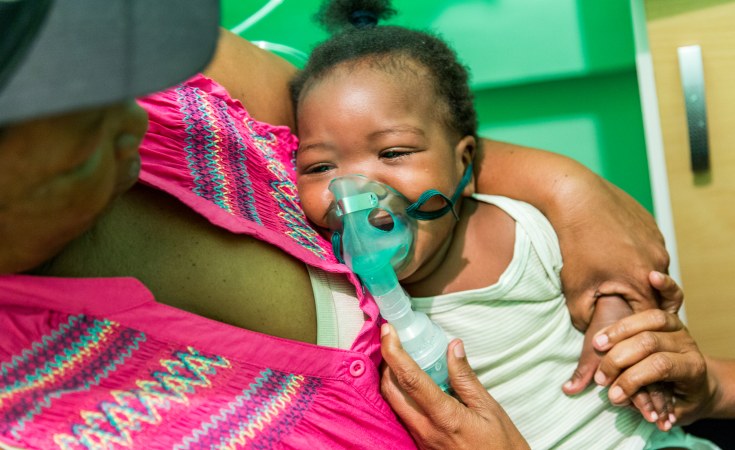The numbers of children who die of pneumonia each year is staggering. In 2015, a child under five died every two minutes – 920,000 in all – and pneumonia is the leading cause of child deaths around the world.
Our progress in the fight against pneumonia remains inadequate. Deaths from measles, AIDS, malaria and diarrhea, the other four main causes of child mortality, are all being reduced at a faster rate. Progress has been slowest in sub-Saharan Africa, which is the cause of greatest concern.
Pneumonia is a disease that cannot be tackled in isolation. As with so many diseases, our unifying advocacy call to 'Stop Pneumonia' is underpinned by complicated and challenging issues which often vary from country to country, and even from town to town.
Although the challenges vary considerably, one aspect has remained remarkably consistent: pneumonia is a disease of poverty. Unfairness and inequity are at the heart of pneumonia deaths. A child from a wealthy background in Nigeria, for instance, is 15 times more likely to be vaccinated against pneumonia than a child from a poor household.
Closely linked to poverty's impact on pneumonia is the risk of malnutrition. Pneumonia often unmasks vulnerability in children who are undernourished, compounding the chances that pneumonia will stunt or kill our youngest. Tragically, a severely malnourished child is nine times more likely to die from pneumonia than one who is well-fed.
Inequity in the availability of medical treatment also greatly affects our ability to treat children who have contracted pneumonia. The disease is most effectively treated by the antibiotic amoxicillin, but this is not always widely available to those who need it most.
Fewer than 60 percent of the medical facilities in Tanzania, Kenya and the Democratic Republic of Congo have a readily available source of amoxillin. In Uganda, the number of medical facilities with access to amoxicillin falls to less than a quarter.
Pollution, too, may play a role in the likelihood of children contracting pneumonia. Children breathe twice as fast as adults, meaning that they take in far more air relative to their bodyweight. This can put a strain on their lungs if they live in a polluted environment. In sub-Saharan Africa, more than eight in 10 households use biomass energy sources in their homes that release soot. Breathing this in at home may put children at risk of contracting pneumonia.
It can become a daunting task to stop pneumonia. There are so many issues to address if we are truly to stop pneumonia deaths, and the scale of challenge is a little scary. While it is extremely difficult to simultaneously drive progress in all of the areas impacting pneumonia, one tool in our inventory is particularly powerful: vaccines.
Just take a look at the success stories in Africa. Ghana introduced the Pneumococcal Conjugate Vaccine (PCV), the most effective immunization we have against pneumonia, in 2011. In one year, the Ghanaian government reached nearly half of its citizens. Now, Ghana has reached near universal immunization coverage against the disease. The Ethiopian Government also introduced PCV in 2011, and now more than three quarters of its people are fully immunized.
It's an old adage, but it's certainly true for pneumonia: prevention is better than cure. Inequity in treatment availability, the risk of antimicrobial resistance, the strain on national health services and ultimately the danger of losing more children's lives are all greatly reduced when our children are immunized against pneumonia.
Today, on World Pneumonia Day, let us all call on African leaders to uphold the commitments they made in the Addis Declaration on Immunization, signed at the African Union summit in February, to invest in PCV coverage and to reduce the number of children dying from pneumonia.
We will all breathe a little easier knowing that the global pneumonia burden is improving, not least the children at risk.
Keith Klugman is Director for Pneumonia at the Bill & Melinda Gates Foundation.


